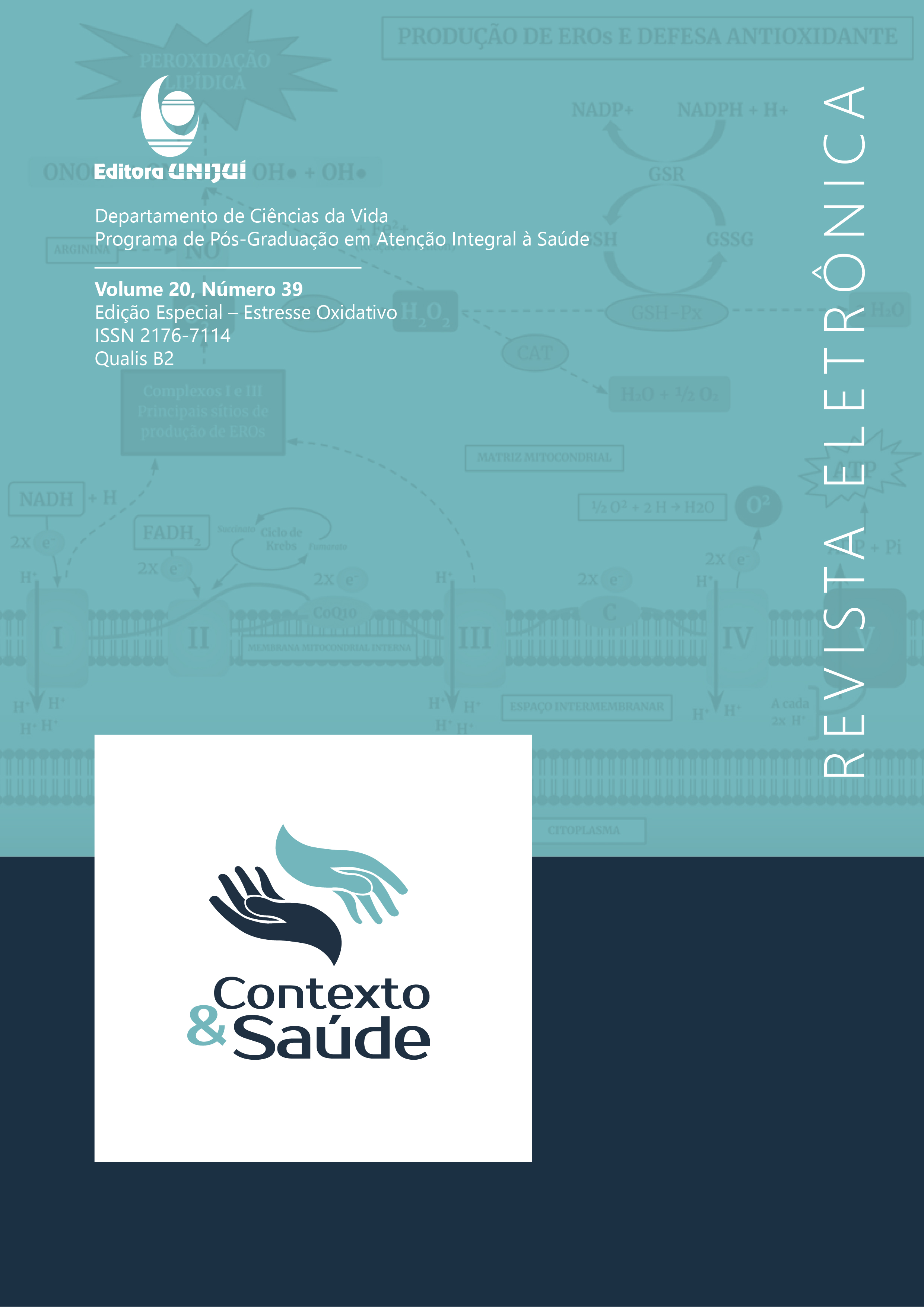L-GLUTAMINE SUPPLEMENTATION ASSOCIATED WITH MODERATE AEROBIC TRAINING IMPROVES BIOMETRIC, GLYCEMIC PROFILE AND THE ANTIOXIDANT DEFENSE
DOI:
https://doi.org/10.21527/2176-7114.2020.39.62-77Palavras-chave:
glucose intolerance, oxidative stress, HSP70, skeletal muscle, adiposityResumo
Introduction: L-glutamine is a non-essential amino acid, whose intrinsic pool of appears to be depleted during catabolic conditions, such as intense or high duration exercise, and to avoid the exercise- related benefits. Therefore, its supplementation could provide an additional source of L-glutamine and prevent these effects. However, the oral intake of its free form has been discouraged, despites of some evidences reporting positive effects. Objective: to verify whether the L-glutamine supplementation (in its free form) could provide an additional improvement in biometric, glycemic and redox parameters, in animals undergoing moderate aerobic training (MAT). Methods: 28 Swiss male mice were divided into four groups: Cont (n=7), Ex (n=7), Glut (n=8), and Ex+Glut (n=6). Glut and Ex+Glut received gastric gavage of L-glutamine (1g/kg), while Cont and Ex groups received 100 µL of PBS one hour before exercising, five days/week, six weeks. Ex and Ex+Glut underwent moderate swimming, while Cont and Glut remained sedentary, for the same period. Mice started swimming with 2% of body weight attached to the tail during 20 min, and ended the experiment with 4% during 60 min. Results: L-glutamine supplementation increased the gastrocnemius mass and improved the glucose tolerance in animals submitted to MAT. It improved the antioxidant status in gastrocnemius, liver and pancreas, and declined it in adipose tissue in animals undergoing MAT. The drop of adipose antioxidant defense was associated with adiposity, while pancreas antioxidant activity was inversely associated with the glucose intolerance. Conclusion: L-glutamine (free form) improves biometric and glucose parameters, and enhances antioxidant activities.
Downloads
Publicado
Como Citar
Edição
Seção
Licença
Ao publicar na Revista Contexto & Saúde, os autores concordam com os seguintes termos:
Os trabalhos seguem a licença Creative Commons Atribuição 4.0 Internacional (CC BY 4.0), que permite:
Compartilhar — copiar e redistribuir o material em qualquer meio ou formato;
Adaptar — remixar, transformar e criar a partir do material para qualquer fim, inclusive comercial.
Essas permissões são irrevogáveis, desde que respeitados os seguintes termos:
Atribuição — os autores devem ser devidamente creditados, com link para a licença e indicação de eventuais alterações realizadas.
Sem restrições adicionais — não podem ser aplicadas condições legais ou tecnológicas que restrinjam o uso permitido pela licença.
Avisos:
A licença não se aplica a elementos em domínio público ou cobertos por exceções legais.
A licença não garante todos os direitos necessários para usos específicos (ex.: direitos de imagem, privacidade ou morais).
A revista não se responsabiliza pelas opiniões expressas nos artigos, que são de exclusiva responsabilidade dos autores. O Editor, com o apoio do Comitê Editorial, reserva-se o direito de sugerir ou solicitar modificações quando necessário.
Somente serão aceitos artigos científicos originais, com resultados de pesquisas de interesse que não tenham sido publicados nem submetidos simultaneamente a outro periódico com o mesmo objetivo.
A menção a marcas comerciais ou produtos específicos destina-se apenas à identificação, sem qualquer vínculo promocional por parte dos autores ou da revista.
Contrato de Licença (para artigos publicados a partir de setembro/2025): Os autores mantém os direitos autorais sobre seu artigo, e concedem à Revista Contexto & Saúde o direito de primeira publicação.

